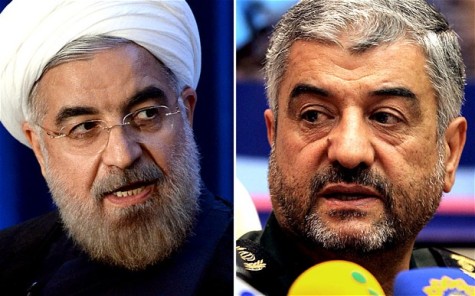Attacks on the Rouhani Government continued last week over its promise to open up Iran’s political and cultural space, with MPs and the Islamic Revolutionary Guards Corps maintaining a line against any appeasement of “sedition”.
Guards commander Mohammad Ali Jafari swept aside Rouhani’s declaration last autumn that the Guards must stay out of politics, as he proclaimed, “In the economic arena, the IRGC and Basij are prepared to perform an active and effective role….The Corps has been present in the arena of culture for some years.”
Jafari challenged, “The honorable administration, however, must request this matter from us and lay the groundwork, and make a demand in reality.”
Tehran Friday Prayer leader Ahmad Khatami warned Rouhani that the Culture Ministry must not fund publications and press “that undermine the people’s beliefs”, and clerics in other cities said, “The enemies of the Islamic Republic have chosen the arenas of culture and economy to confront Iran.”
Rouhani tried to hit back, “This administration has come to confront extremism. The worst forms of extremism are lies and accusations. The worse extremism is not telling the realities to the people.”
However, the Government made no attempt to revive initiatives such as opening access to the Internet and social media sites, let alone pursue the cases of political prisoners.
As Iran came out of its New Year holidays, another development seized headlines, with the Sunni insurgency Jaish ul-Adl executing one of five kidnapped Iranian border guards in Pakistan and threatening to kill another this week if demands are not met. Iranian media was filled with criticism of Islamabad — and the Rouhani Government — for not doing enough to free the guards, as the IRGC took control of security on the border between southeastern Iran and Pakistan.
The nuclear front was quiet this week, ahead of expert talks and then high-level discussions between Iran and the 5+1 Powers in Vienna from April 7-9. The head of Iran’s Atomic Energy Organization, Ali Akbar Salehi, restated Tehran’s fundamental claim to enrichment of uranium to 5%, but indicated that compromise might be possible over the status of the Arak heavy-water reactor.
FORECAST
The Rouhani Government will continue to hold a cautious line inside Iran, making no significant steps amid the hardline pressure on it, as it hopes for positive news from next week’s nuclear talks in Vienna. MPs and clerics will continue the rhetorical assault on the cultural front, but they await economic downturn or a collapse of the nuclear discussions to turn rhetoric into a wider attack on Rouhani’s authority.
The case of the kidnapped Iranian border guards has taken on greater significance with the execution of one of the men. Iranian nerves over border security, as the Sunni insurgency Jaish ul-Adl continues its attacks, are raising political tension in Tehran.
With that rise in tension, the Islamic Revolutionary Guards Corps are testing an expansion of their influence, following their setback last summer with Rouhani’s election. The effort is at an early stage, but it is notable that the President has made no comment, avoiding any confrontation at this point.
FEATURED ANALYSES
Rouhani Struggles with Economy and “Culture War”
Video Analysis: Nuclear Talks — No News Really is Good News
Sequel: Pentagon/New York Times’ “Scary Iranian PR Ship” That is Still A Movie Prop
Pentagon’s and New York Times’ “Scary Iranian PR Ship” Turns Out to Be Movie Prop

